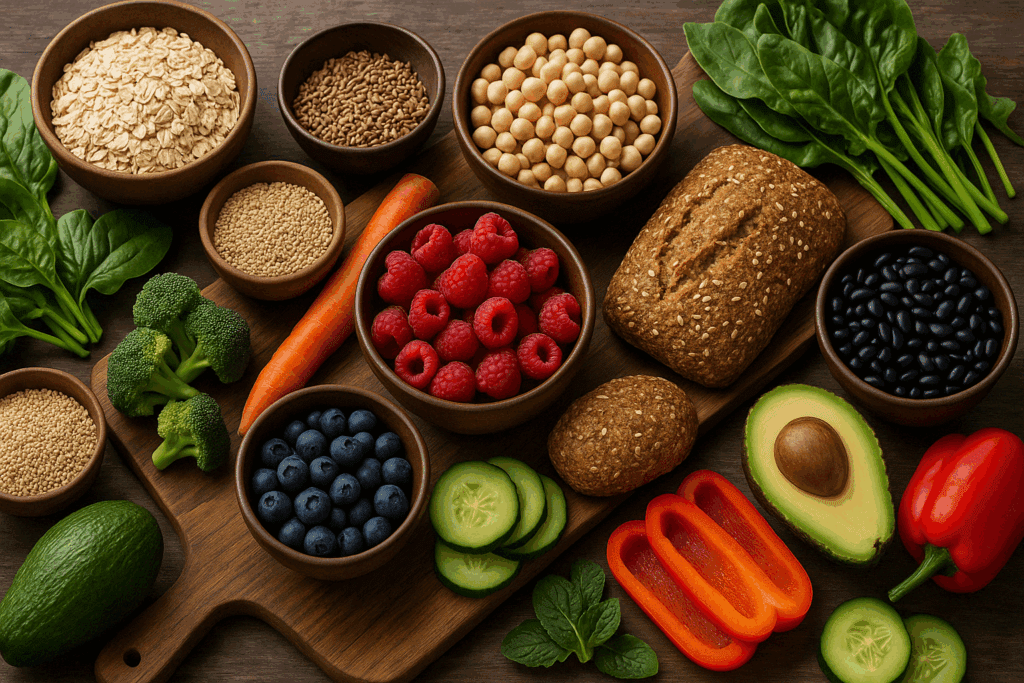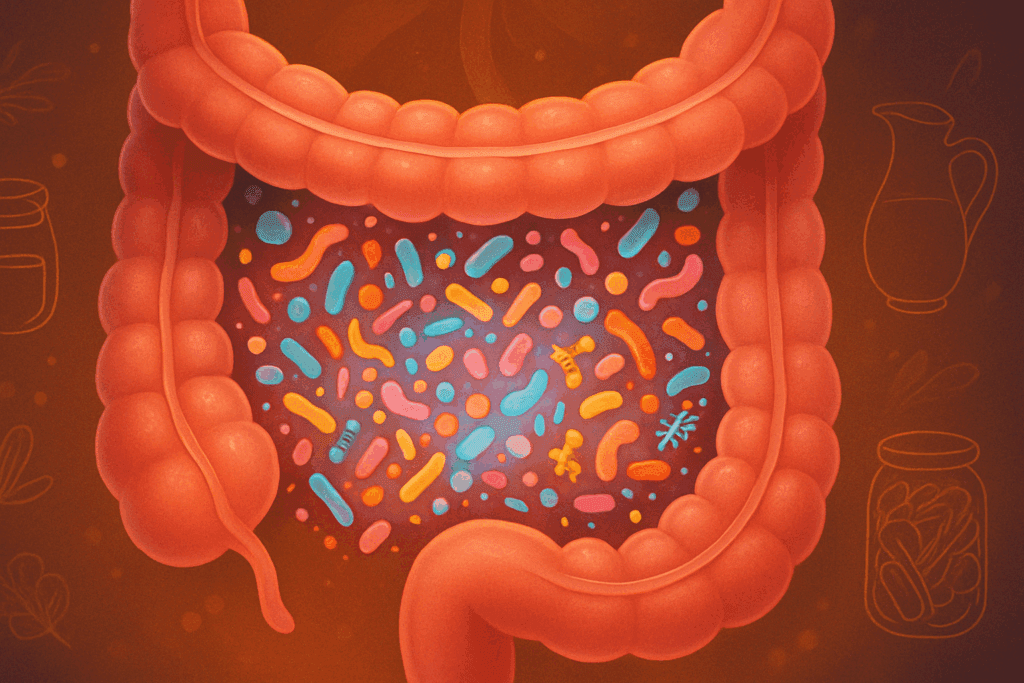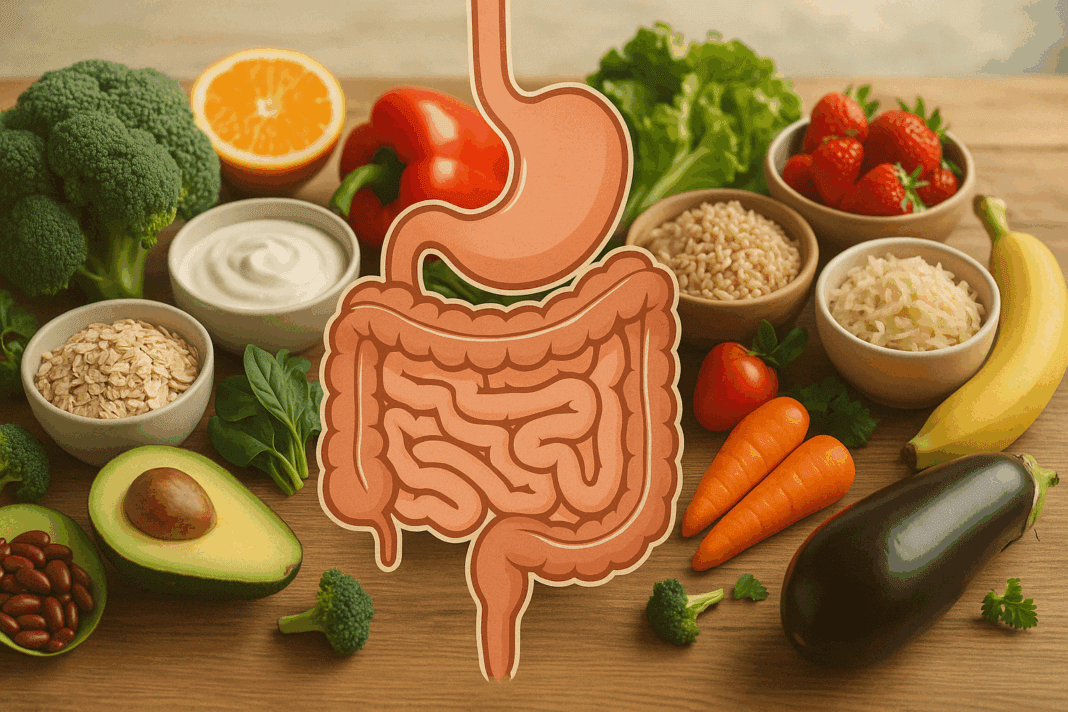The human digestive system is an intricately orchestrated process responsible for breaking down food, absorbing nutrients, and eliminating waste. For millions of people, digestive health is central to everyday well-being, yet often goes unrecognized until symptoms arise. Understanding what helps digestion isn’t just about alleviating occasional discomfort; it’s about nurturing the gut as a core component of whole-body health. Modern research continues to unravel the complex interplay between diet, microbiota, mental health, and lifestyle in shaping digestion health. In this comprehensive guide, we explore science-backed strategies that support optimal digestion and promote long-term gastrointestinal wellness.
You may also like: Macronutrients vs Micronutrients: What the Simple Definition of Macronutrients Reveals About Your Diet and Health

Optimal Digestion Begins with Mindful Eating
One of the most overlooked yet powerful contributors to digestion health is the act of eating itself. Mindful eating emphasizes awareness and presence during meals, which facilitates the physiological process of digestion beginning with the cephalic phase—when the sight, smell, and anticipation of food trigger the release of digestive enzymes. By eating slowly and chewing thoroughly, individuals activate salivary amylase, initiating carbohydrate breakdown in the mouth and reducing the digestive load on the stomach and intestines. Studies have shown that mindful eating reduces post-meal bloating and improves nutrient absorption, which further underscores its value.
Eating in a relaxed setting without distractions like screens can reduce the risk of overeating and allow the parasympathetic nervous system—often called the “rest and digest” system—to function optimally. When people are stressed or eating on the go, the sympathetic nervous system inhibits digestion, leading to symptoms such as indigestion, cramping, or reflux. Consistent mindfulness at meals cultivates a digestive-friendly internal environment and supports long-term gut health through behavioral retraining.

The Crucial Role of Dietary Fiber in Digestive Health
Fiber remains one of the most critical components in determining what helps digestion effectively. Dietary fiber, found in fruits, vegetables, whole grains, legumes, nuts, and seeds, plays multiple roles in digestive wellness. Soluble fiber, which dissolves in water, forms a gel-like substance that slows digestion and enhances nutrient absorption. Insoluble fiber, on the other hand, adds bulk to stool and promotes regular bowel movements by stimulating peristalsis.
Clinical guidelines consistently recommend 25 to 38 grams of fiber daily for adults, yet many fall short of this target. Research demonstrates that adequate fiber intake can reduce the risk of constipation, diverticulosis, colorectal cancer, and even cardiovascular diseases, thanks to the fiber’s cholesterol-lowering properties. Notably, the fermentation of certain fibers in the colon produces short-chain fatty acids (SCFAs) like butyrate, which nourish colon cells and modulate inflammation—a key factor in digestion health.
Gradually increasing fiber intake, along with sufficient water consumption, helps the gastrointestinal tract adjust and prevents discomfort. For individuals with irritable bowel syndrome (IBS), soluble fiber sources like oats and psyllium husk may be better tolerated than rough insoluble fibers. Personalized approaches to fiber are essential, and understanding which sources benefit one’s unique gut environment can make all the difference.

Gut Microbiome: The Microbial Heart of Digestion
Over the past two decades, research into the human gut microbiome has revolutionized our understanding of digestion health. The trillions of microbes inhabiting the gastrointestinal tract are not passive bystanders; they actively regulate digestion, metabolism, immune function, and even mood through the gut-brain axis. A diverse and balanced microbiota supports digestion by breaking down complex carbohydrates, synthesizing certain vitamins, and outcompeting harmful pathogens.
What helps digestion most effectively in this context is a diet rich in prebiotics and probiotics. Prebiotics are nondigestible plant fibers that selectively feed beneficial bacteria, with inulin, chicory root, garlic, and onions being particularly potent sources. Probiotics, found in fermented foods like yogurt, kefir, sauerkraut, kimchi, and miso, introduce live beneficial strains such as Lactobacillus and Bifidobacterium into the gut ecosystem. Together, these components help build microbial resilience and enhance digestive efficiency.
Scientific literature supports the use of targeted probiotic supplementation for specific conditions such as antibiotic-associated diarrhea, constipation, and IBS. However, the effects are strain-specific, and not all products are equally effective. Personalized probiotic regimens, guided by healthcare professionals, may provide the most benefit for those seeking to enhance digestion health through microbiome support.

Hydration and Electrolyte Balance in Digestive Function
Water is often underestimated in discussions of what helps digestion, yet it is vital at every stage of the process. From softening food during mastication to facilitating nutrient absorption and stool formation, hydration underpins efficient digestive physiology. Dehydration can slow down transit time in the colon, leading to hardened stools and constipation. Conversely, optimal hydration supports enzyme activity and motility, ensuring smoother digestive function.
Electrolytes such as sodium, potassium, magnesium, and chloride also play key roles in muscular contractions of the gastrointestinal tract. Electrolyte imbalances, often caused by inadequate fluid intake or excessive losses through vomiting or diarrhea, can impair digestion and increase susceptibility to cramps, nausea, or fatigue. A balanced intake of hydrating fluids and mineral-rich foods is critical, especially in warm climates or during periods of illness.
Incorporating water-rich fruits and vegetables—such as cucumbers, watermelon, oranges, and leafy greens—can provide both hydration and nutritional synergy. Herbal teas like ginger or peppermint also offer digestive benefits, with ginger aiding motility and peppermint relieving symptoms of functional dyspepsia. The intersection of hydration and plant-based nourishment exemplifies how simple strategies contribute meaningfully to digestion health.
Enzymes and Stomach Acid: Digestive Catalysts
Digestive enzymes and gastric acid are fundamental in the chemical breakdown of food. Produced by salivary glands, the stomach, pancreas, and small intestine, enzymes facilitate the conversion of macronutrients into absorbable units. For example, proteases digest proteins, amylases break down carbohydrates, and lipases emulsify fats. Stomach acid (hydrochloric acid or HCl) creates the acidic environment necessary for enzyme activation and acts as a first line of defense against ingested pathogens.
In some individuals, insufficient stomach acid or pancreatic enzymes can impair nutrient breakdown and lead to symptoms such as bloating, indigestion, or malabsorption. Conditions like hypochlorhydria (low stomach acid) or exocrine pancreatic insufficiency highlight the importance of these digestive agents. Supplementation with digestive enzymes or betaine HCl under clinical supervision can offer therapeutic support.
Additionally, lifestyle factors such as overuse of antacids or proton pump inhibitors (PPIs) can interfere with natural acid production, underscoring the need for careful evaluation before long-term use. Supporting the body’s natural enzymatic capacity through a whole-foods diet and avoiding excessive processed foods is one of the most sustainable ways to preserve digestion health.

The Link Between Stress, Sleep, and Digestion
The digestive tract is profoundly influenced by the central nervous system, with stress being one of the most common disruptors of gastrointestinal health. Acute stress can alter gut motility, secretion, and permeability, while chronic stress has been linked to dysbiosis, inflammation, and disorders such as IBS. Through the gut-brain axis, emotional well-being and digestion are bidirectionally connected.
What helps digestion from a psychological standpoint includes stress-reduction practices like mindfulness meditation, deep breathing, yoga, and cognitive-behavioral therapy. These interventions have shown promise in reducing gastrointestinal symptoms and improving quality of life in individuals with functional bowel disorders. Cultivating emotional resilience and parasympathetic tone enables more efficient digestion by optimizing blood flow and neuromuscular coordination.
Sleep quality also plays a substantial role in digestion health. Irregular sleep patterns and poor sleep hygiene are associated with delayed gastric emptying, reduced insulin sensitivity, and altered gut microbiota composition. Prioritizing sleep consistency, limiting stimulants, and creating a calming bedtime routine are essential steps toward improving both rest and digestive function.
Avoiding Common Digestive Triggers
While promoting what helps digestion is crucial, avoiding known digestive triggers can be equally transformative. Common dietary culprits include excessive caffeine, alcohol, high-fat fried foods, artificial sweeteners, and ultra-processed snacks. These substances may irritate the gut lining, disrupt the microbiome, or impair motility, especially in sensitive individuals.
Food intolerances or sensitivities, such as lactose or gluten intolerance, also merit consideration. Elimination diets under professional guidance can help identify problematic foods and guide long-term dietary adjustments. It’s important to distinguish between true allergies, which involve the immune system, and intolerances, which often manifest through bloating, gas, or changes in bowel habits.
Lifestyle choices such as overeating, skipping meals, or lying down immediately after eating can also impair digestion. Creating structured meal times and allowing for gentle post-meal movement can reduce reflux and enhance gastric emptying. Developing awareness of personal patterns and triggers allows for proactive decision-making and better digestion health over time.

Movement, Posture, and the Mechanics of Digestion
Physical movement is not only beneficial for cardiovascular and mental health but also plays a key role in gastrointestinal motility. Regular moderate exercise, such as walking, cycling, or yoga, stimulates peristalsis and helps prevent constipation. Movement enhances circulation to the digestive organs and may modulate microbiota diversity through anti-inflammatory pathways.
Posture also affects digestion, especially during and after meals. Slouching can compress abdominal organs and inhibit optimal digestion, while upright postures facilitate esophageal clearance and gastric emptying. Even minor postural adjustments, like sitting at a 90-degree angle while eating and remaining upright for 20 to 30 minutes afterward, can significantly improve comfort and reduce reflux.
Abdominal massage techniques and diaphragmatic breathing further support mechanical aspects of digestion. These practices stimulate the vagus nerve, increase intestinal blood flow, and relax abdominal tension. When integrated consistently, body mechanics can enhance the digestive process in ways that are both accessible and effective.
Harnessing the Power of Nutritional Diversity
A diverse, colorful, and minimally processed diet is a cornerstone of digestion health. Nutritional variety exposes the gut to a broad range of phytochemicals, fibers, enzymes, and micronutrients, all of which contribute to a thriving microbiome and efficient digestion. The Mediterranean diet, with its emphasis on whole grains, legumes, fruits, vegetables, healthy fats, and fermented foods, has been widely studied for its beneficial effects on gut health.
Rotating food choices and including seasonal produce helps reduce the risk of developing food sensitivities and supports microbial diversity. Polyphenol-rich foods such as berries, green tea, dark chocolate, and olives exhibit prebiotic-like properties that feed beneficial gut bacteria and reduce oxidative stress. Culinary herbs and spices, including turmeric, ginger, fennel, and cumin, also possess carminative effects that soothe the digestive tract and improve motility.
Tailoring the diet to individual needs, including cultural preferences, ethical choices, and medical conditions, ensures sustainability and adherence. Functional nutrition approaches consider digestion health as a personalized journey, where food becomes both nourishment and medicine.
Frequently Asked Questions (FAQ): What Helps Digestion? Science-Backed Insights for Better Digestion Health
1. Can emotional well-being impact digestion health in the long term?
Yes, emotional well-being plays a surprisingly significant role in digestion health. Chronic emotional stress can impair gut motility, reduce enzyme secretion, and even disrupt the delicate balance of gut bacteria. While stress-induced changes may not always present immediate symptoms, the long-term consequences can include gastrointestinal disorders like IBS or functional dyspepsia. What helps digestion in this context is developing resilience through emotional regulation practices such as journaling, guided therapy, or cultivating supportive social relationships. Over time, managing mental health not only eases emotional burden but also supports the digestive system’s ability to function without chronic inflammation or hypersensitivity.
2. How does meal timing influence what helps digestion?
Meal timing is often overlooked but is increasingly recognized as a critical factor in digestion health. Eating large meals late at night can disrupt circadian rhythms and impair processes like gastric emptying and bile flow. Instead, aligning eating patterns with the body’s internal clock—by consuming larger meals earlier in the day and lighter ones in the evening—can enhance metabolic efficiency. What helps digestion more effectively is allowing the gut adequate time to rest between meals, supporting its natural migratory motor complex (MMC), a wave-like cleaning process that occurs during fasting. This practice reduces bacterial overgrowth and contributes to long-term digestive resilience.
3. Are certain breathing techniques beneficial for improving digestion health?
Absolutely. Deep diaphragmatic breathing exercises can stimulate the vagus nerve, which plays a central role in activating the parasympathetic nervous system—the key player in “rest and digest” responses. People often underestimate how shallow, stress-induced breathing hinders this function. By incorporating five to ten minutes of slow, belly-focused breathing before meals, individuals can prime their bodies to optimize nutrient breakdown and absorption. What helps digestion in these moments isn’t just mechanical function, but a physiological shift that creates the ideal internal environment for gastrointestinal processes to unfold efficiently.
4. Can intergenerational health factors influence how well someone digests food?
Yes, family history and early childhood exposures can shape how an individual’s digestive system functions over a lifetime. Emerging research in epigenetics suggests that environmental influences on grandparents or parents, such as antibiotic overuse, nutrient deficiencies, or poor microbial exposure, can affect offspring’s gut microbiota composition and enzyme expression. Understanding what helps digestion in such cases involves a more personalized approach, including microbiome testing and targeted dietary strategies. Recognizing these inherited patterns allows for proactive intervention, especially in families with a history of GI disorders. This broader perspective underscores digestion health as a generational issue, not merely an individual one.
5. What helps digestion when traveling or facing disruptions in routine?
Travel often challenges digestion health due to irregular meal times, unfamiliar foods, and dehydration. Portable strategies like packing probiotic supplements, staying hydrated with electrolyte-enhanced water, and pre-planning meals rich in fiber can ease the digestive transition. Eating at consistent intervals and avoiding overeating at buffets or social gatherings is especially important. For some, bringing familiar snacks or herbal teas such as ginger or chamomile can help maintain digestive regularity. What helps digestion most while traveling is minimizing stress and unpredictability where possible, ensuring the gastrointestinal system stays as close to homeostasis as possible.
6. How does aging change the way our bodies digest food, and what helps digestion in later life?
As we age, several physiological changes can affect digestion health, including decreased stomach acid production, slower gastrointestinal motility, and altered gut microbiota diversity. These shifts can lead to challenges such as nutrient malabsorption, constipation, and increased susceptibility to GI infections. What helps digestion in older adults often involves gentle dietary adjustments such as increasing easily digestible protein sources, incorporating prebiotic-rich foods, and consuming fermented products regularly. Chewing food thoroughly and maintaining physical activity also become more important to stimulate peristalsis. Tailoring interventions to the needs of an aging gut ensures that digestion health remains intact through the decades.
7. Is there a connection between skin health and digestion health?
There is growing evidence to support the gut-skin axis, a bidirectional communication system linking digestion health with dermatological conditions. Conditions such as acne, eczema, and rosacea often correlate with gut dysbiosis, increased intestinal permeability, or chronic inflammation. What helps digestion in these cases can also enhance skin clarity—including anti-inflammatory diets, fiber-rich plant foods, and probiotic supplementation. Moreover, eliminating potential gut irritants like excessive dairy or processed sugars may lead to visible skin improvements. Understanding skin concerns through the lens of gut function opens new doors for holistic healing strategies.
8. Are there technological innovations emerging in the field of digestion health?
Yes, the intersection of digital health and gastroenterology is expanding rapidly. From wearable trackers that monitor gut motility to AI-driven microbiome analysis tools, technology is offering unprecedented insights into what helps digestion on an individualized basis. For instance, continuous glucose monitors can reveal post-meal blood sugar spikes that indirectly reflect digestive efficiency and food compatibility. Meanwhile, digital apps using machine learning can suggest meal adjustments based on real-time symptom tracking. These innovations enhance digestion health by shifting care from generalized advice to precision-based interventions.
9. Can social eating habits affect what helps digestion in subtle ways?
Absolutely. Social dynamics often shape how, when, and what people eat—all of which influence digestion health. For example, eating too quickly in a group setting or feeling pressure to consume certain foods can disrupt the mindful rhythm needed for optimal digestion. Conversely, communal meals rooted in slower traditions, such as those in Mediterranean or Asian cultures, naturally encourage better chewing, pacing, and enjoyment of food. What helps digestion in social settings is awareness: understanding your own pace, setting healthy boundaries, and aligning group meals with your physiological comfort. Social habits, when aligned with digestive rhythms, can become powerful tools for gut wellness.
10. How do food preparation methods influence what helps digestion?
The way food is cooked or fermented can significantly impact digestion health, especially for individuals with sensitivities or compromised gut function. For example, soaking and sprouting legumes reduces anti-nutrients like phytic acid, making minerals more bioavailable. Slow cooking tough meats or fibrous vegetables helps break down connective tissues and cellulose, easing digestive workload. Fermentation transforms foods like cabbage into gut-friendly options such as sauerkraut, rich in both probiotics and enzymes. What helps digestion in this culinary context is mindful preparation—choosing cooking techniques that preserve nutrients while enhancing bioaccessibility. This strategy marries culinary tradition with digestive science in a practical, accessible way.
Conclusion: Embracing Lifelong Strategies for Digestive Wellness
Improving digestion health is a dynamic process that involves more than isolated dietary changes or short-term interventions. By embracing holistic and science-backed strategies, individuals can create lasting habits that enhance both immediate digestive comfort and long-term well-being. Understanding what helps digestion requires a multidimensional perspective that incorporates mindful eating, nutritional diversity, gut microbiome support, hydration, movement, and emotional balance.
When implemented with consistency and care, these lifestyle choices support the body’s natural digestive rhythm and create a foundation for resilience against chronic digestive conditions. Moreover, they empower individuals to take ownership of their health in ways that are both intuitive and evidence-based. In a world increasingly dominated by convenience and stress, returning to the basics of how we eat, move, sleep, and manage stress may be the most profound investment in digestion health.
As ongoing research continues to reveal the interconnectedness of gut function with immunity, metabolism, and even cognition, prioritizing digestive wellness is no longer optional—it is essential. Through informed choices and practical action, each person holds the potential to transform their digestive health and by extension, their quality of life.


